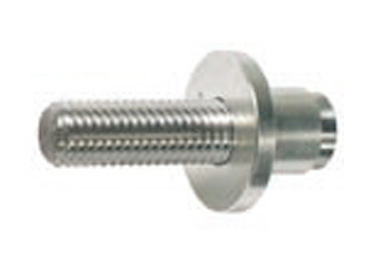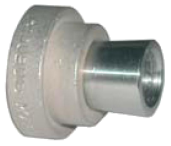style="color:#1F2329;font-family:Inter, -apple-system, BlinkMacSystemFont, "background-color:#FFFFFF;font-size:16px;">In the field of industrial equipment grounding, the reliability, ease of installation, and adaptability of grounding components are directly related to equipment safety and operational stability. The French Dubuis Hydraulic Expansion Grounding Plug, with its innovative hydraulic expansion design and precise performance positioning, breaks through the limitations of traditional grounding methods. It demonstrates significant advantages in metal equipment grounding scenarios, especially suitable for special needs such as difficult-to-weld materials and the protection of valuable equipment, making it a preferred component for grounding systems in industries like industrial manufacturing, electronics, and medical care.
From the perspective of core fixing principles, the performance foundation of the Dubuis Hydraulic Expansion Grounding Plug lies in the "tapered fit between the conical screw and the sleeve," achieving efficient fixing through hydraulic tension. The plug consists of two core structures: a conical screw and an expansion sleeve, both designed with matching taper parameters. When an axial tensile force is applied to the conical screw using a hydraulic tool, the screw advances into the sleeve. Its conical structure exerts a uniform radial expansion force on the inner wall of the sleeve, prompting the sleeve to expand outward radially. This expansion is not a simple deformation; instead, through precise taper design, the sleeve forms a tight interference fit with the inner wall of the through-hole or blind hole. After expansion, the sleeve tightly "adheres" to the hole wall, not only generating sufficient friction to fix the plug in place but also forming a stable mechanical connection through physical engagement. This ensures the plug does not loosen due to factors like vibration or temperature changes during long-term use, providing durable and reliable foundational support for the grounding system. Compared with traditional thread fixing or welded grounding methods, this hydraulic expansion principle eliminates the need for complex processing of the hole wall, avoids damage to the hole wall material caused by welding high temperatures, and adapts to various hole diameter specifications, significantly enhancing flexibility.
The "simple and fast installation" and "single-side operation" characteristics are the core advantages of the Dubuis Hydraulic Expansion Grounding Plug in terms of efficiency. When installing traditional grounding components, double-side operation is often required (e.g., bolt fixing needs coordination for tightening on both sides) or complex tools are dependent (e.g., welding requires carrying welding machines and cleaning tools). Especially in scenarios with compact equipment structures and limited operating space, installation efficiency is extremely low. However, the Dubuis Plug can be installed with "single-side operation" only: the operator simply places the plug on one side of the hole, applies tension to the conical screw using a dedicated hydraulic tool, and the sleeve expansion and fixing are triggered. The entire process requires no coordination from the other side and can be completed by a single person. Taking the grounding installation of a large industrial control cabinet as an example, traditional bolt grounding requires two people to cooperate—one positioning inside the cabinet and the other tightening outside—taking approximately 20 minutes. With the Dubuis Plug, a single person can complete the grounding installation of a single point in just 5 minutes, increasing efficiency by 4 times. Meanwhile, the hydraulic tool is easy to operate, requiring no professional welding or mechanical processing skills. Ordinary workers can master it after simple training, greatly reducing labor costs and operational thresholds.
In terms of applicable scenarios, the Dubuis Hydraulic Expansion Grounding Plug accurately solves the grounding challenges of "difficult-to-weld materials" and "valuable equipment." In the industrial field, some metal materials (such as aluminum alloys and titanium alloys) have special melting points or are prone to cracks during welding. Welded grounding is not only difficult but may also damage the material structure. For valuable equipment like precision instruments and medical devices, high welding temperatures and weld stress may damage internal components, resulting in huge economic losses. The Dubuis Plug achieves reliable grounding through mechanical expansion fixing without welding: the tight fit between the expansion sleeve and the hole wall forms a stable current conduction path, meeting grounding requirements. For instance, in the aerospace field, if welding is used for grounding aluminum alloy fuselage components, it may easily reduce the component strength. However, the Dubuis Plug can realize a reliable connection between the fuselage and the grounding system without damaging the fuselage material. In the medical equipment field, for the grounding of valuable equipment like nuclear magnetic resonance (NMR) machines, the Dubuis Plug avoids interference from welding on the internal precision circuits of the equipment while ensuring grounding stability, complying with the strict safety standards for medical equipment.
What is more noteworthy is that compared with welded grounding, the Dubuis Plug provides key guarantees for equipment safety by virtue of its "larger contact area" and "stronger instantaneous short-circuit current carrying capacity." The current conduction of welded grounding relies on weld spots, which have a small area and are prone to increased contact resistance due to oxidation and corrosion. When encountering instantaneous short-circuit current, the weld spots are likely to melt due to overload, leading to grounding failure. In contrast, the expansion sleeve of the Dubuis Plug forms a "surface contact" with the hole wall, with a contact area 5-8 times that of traditional weld spots. Moreover, the stability of the mechanical connection is not affected by oxidation, maintaining a low contact resistance for a long time. This structural feature enables it to carry larger instantaneous short-circuit currents: in power equipment grounding scenarios, when a short-circuit fault occurs in the equipment, the Dubuis Plug can quickly conduct the short-circuit current away, preventing equipment burnout caused by current accumulation. In the electronics field, its low contact resistance can effectively suppress electrostatic interference, protecting precision components such as chips and circuit boards from electrostatic damage. Actual test data shows that the instantaneous short-circuit current carrying capacity of the Dubuis Hydraulic Expansion Grounding Plug can reach more than 3 times that of traditional welded grounding, building a solid defense line for the safe operation of equipment.
With four core performances—"efficient fixing, easy installation, wide adaptability, and safety reliability"—the French Dubuis Hydraulic Expansion Grounding Plug redefines the standards for industrial grounding components. Whether it is the grounding needs of difficult-to-weld materials, the safety protection of valuable equipment, or the demand for efficient installation scenarios, it can provide precise solutions. In fields with strict grounding requirements such as industrial automation, aerospace, and medical equipment, the Dubuis Plug is becoming an important force in ensuring equipment safety and improving the stability of grounding systems with its outstanding performance, providing solid support for safe production and efficient operation in various industries.

